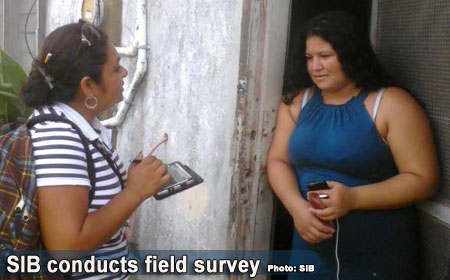BELIZE CITY–Caribbean Statistics Day 2014 is being observed today, Wednesday, October 15, in CARICOM countries such as Belize. The Statistical Institute of Belize (SIB) is the agency responsible for producing statistical information, including estimates of inflation, external trade and the Gross Domestic Product (GDP).
Caribbean Statistics Day is being observed under the theme “Data Revolution for Sustainable Development of CARICOM — Designing and Operationalizing a Framework for Statistics in the Post-2015 Development Agenda.”
Diana Castillo-Trejo, Manager of the SIB’s Data Dissemination Department, said that the SIB is using the occasion as an opportunity to highlight the importance of its work.
Acting Director General, Dr. Leopold Perriott, said that the key is to foster sustainable development for the betterment of the region.
“Statistics is used by everybody: by Government, by schools, private entities, insurance companies, banks, by regular people; and so then what we have to do is to produce… the indicators and statistics that people really want; and so one of my emphases will be touching bases much more closely with clients to find out exactly what they want,” Perriott told us.
The SIB has its headquarters in the city of Belmopan, but it also has offices in the districts, in Punta Gorda, Stann Creek, San Ignacio, Belmopan, Belize City and Corozal. These offices are used mainly to help organize surveys and they handle lots of paper and communications, Perriott said.
Perriott said that the SIB has a small staff, and the section that produces economic statistics has only 4 people, when there are typically 7 in similar units in the region.
“That means that we can’t do the wide breadth of indicators we would really want to do. We have to prioritize,” he said.
According to Trejo, there are 35 staff members, and surveys and census projects generally require temporary staff to get the job done in a timely fashion. To undertake work in rural and more remote areas, workers are recruited who are familiar with those communities and who know how to get around.
Their biggest undertaking is the national census, done every 10 years. The next one is due 2020, but Trejo said that they will need to start preparing for it in the coming year.
Perriott said that one of the areas they would like to reform is how the nation’s Gross Domestic Product (GDP) is represented, which, he said, is hard to accomplish, even for the most well-supplied statistical office.
He said that they still face the challenge of coming up with a more accurate assessment of production, which would also include more small enterprises such as panades shops and taxi operators. However, Perriott said that illegal economic activities should also form part of the national accounts – including proceeds from prostitution, cocaine trafficking, illegal logging, etc.
“If we could get a handle of the illegal activities, it would change the whole landscape of the GDP,” Perriott said.
The mid-year population estimate, estimated by demographer Jaqueline Small, puts Belize’s population at 358,899. Life expectancy is 73.7 years on average and the poverty rate is 41.3%.
The SIB plans to release its next set of data next month.

